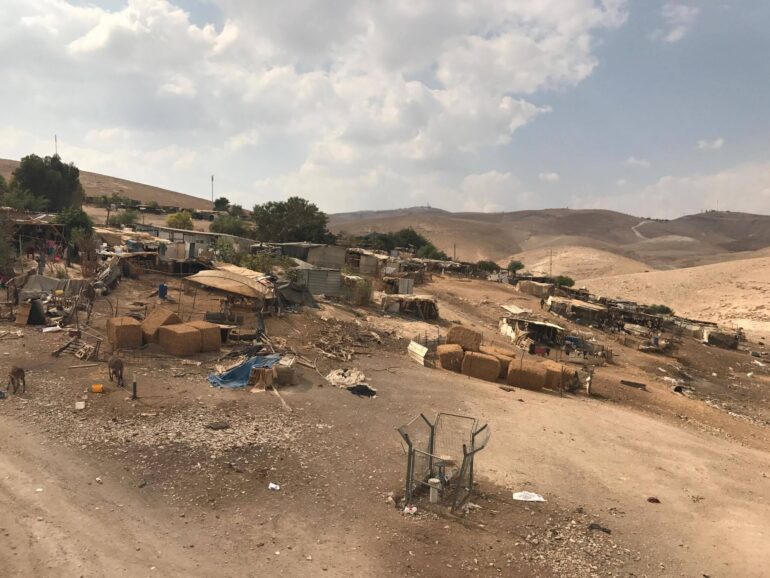Prime Minister Binyamin Netanyahu (Likud) on Saturday indefinitely postponed the demolition of Khan al-Ahmar, a West Bank Bedouin village whose slated destruction became the focus of international attention.
Sources in Netanyahu’s office said the delay was to allow more time for talks with Khan al-Ahmar residents and to consider alternatives to destroying the community.
The destruction of Khan al-Ahmar appeared imminent last week, as security forces warned activists against carrying out “illegal” activities during the razing of the Palestinian village just east of Jerusalem.
Late last month, the Israeli Civil Administration gave Khan al-Ahmar residents an October 1 deadline to pack up their belongings and demolish all structures.
Three weeks have passed since the deadline and the community still stands, despite expectations from residents, activists and state officials for the demolitions to take place last week.
In May, Israel’s Supreme Court approved of the state’s plan to demolish Khan al-Ahmar, which they said was established illegally without building permits.
Saturday’s announcement was met with rebuke from Netanyahu’s political rivals, trying to position themselves ahead of upcoming elections as more hardline than the prime minister on Palestinian issues.
The office of Defense Minister Avigdor Lieberman (Yisrael Beiteinu) issued a statement Saturday night condemning the delay.
“The decision to delay the clearance of Khan al-Ahmar was made in complete opposition to the stance of the defense minister and despite his firm objection,” Lieberman’s office said in a statement.
According to a report from Sunday’s cabinet meeting, Education Minister Naftali Bennett (Bayit Yehudi) exchanged words with Netanyahu after ministers were instructed not to be interviewed on the issue.
Bennett announced Sunday morning prior to the meeting that he would work vigorously to implement the demolition order for the Beduin community.
“Khan al-Ahmar will be evacuated,” he said. “This is an illegal construction whose destruction was approved by the Supreme Court.”
“In a state which abides by the rule of law, the law is enforced even if there is opposition or threats from the international community… The Bayit Yehudi party will make sure that it happens.”
What has been especially unsettling about the struggle surrounding Khan al-Ahmar has been the extent to which Jewish nationalists have expressed support for the demolition, demonstrating how politicized the construction and destruction of homes in the West Bank has become.
Equally disappointing is the fact that Palestinians and their supports rarely oppose the destruction of Jewish communities. Rather than succumb to the trap of an “us versus them” mindset, West Bank Jews and Palestinians should realize that, although our situations are radically different, the injustices both peoples experience often result from the same core issues plaguing Israeli society.
Whether directed against Palestinians or Jews, Israel’s politically-motivated policy of demolishing homes and destroying entire communities stems from the same colonized identity and lack of moral compass that fuels our conflict and keeps us subservient to the West.





